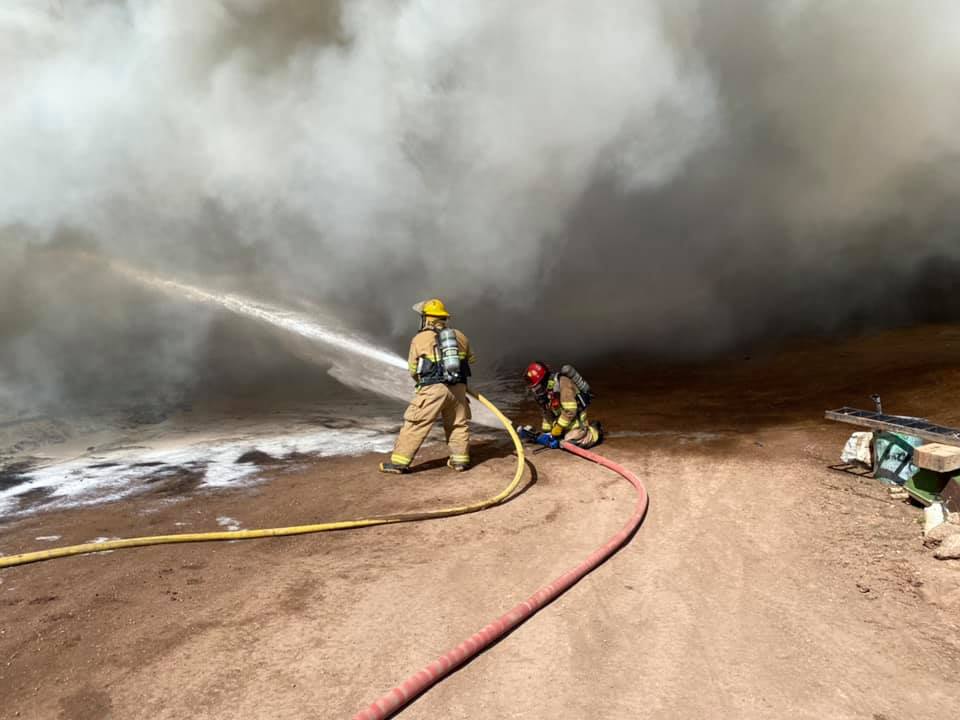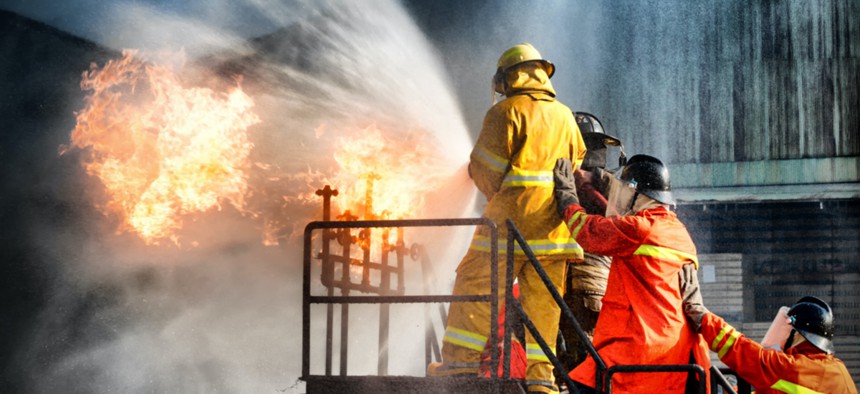Connecting state and local government leaders
Staffing shortages, fundraising difficulties and a lack of personal protective equipment have forced rural and volunteer-driven fire departments to adapt quickly.
Months ago, before the threat of the novel coronavirus was something people worried about in rural Wyoming, volunteers with Uinta County Fire and Ambulance held their annual awards banquet.
Several days later, one attendee began feeling sick.
“This was before Covid-19 had really gotten here, but this person had traveled to New Jersey the week prior,” said Eric Quinney, chief administrative officer for the Evanston, Wyoming-based department, which has 120 volunteer firefighters and paramedics. “They went in to get tested, and early on, before the results were in, we thought, ‘Man, our whole department could have been exposed at this banquet.’ And we certainly couldn’t quarantine the entire department and put them out of service for 14 days, because the 911 calls have to be answered.”
The volunteer ended up testing negative for the virus. But the experience threw into sharp relief the particular dangers facing the rural department, Quinney said.
“The unknown of this running through a large group of first responders was a wake-up call,” he said. “We don’t have the backup of people like larger cities do to try to bridge the gap.”
Across the country, fire departments are adjusting to the coronavirus pandemic, changing protocols to try to reduce the risk of exposure among first responders, coping with a shortage of personal protective equipment and figuring out the potential budget challenges facing many local government agencies. For small departments, there are additional dilemmas, starting with fewer volunteers willing or able to work. Departments also have been forced to cancel fundraising events, a vital source of revenue for rural companies.
These challenges are widespread. More than 80% of fire departments nationally are all or mostly volunteer, according to the National Volunteer Fire Council.
Dave Finger, chief of legislative and regulatory affairs for the nonprofit membership group, said keeping firefighters safe on the job is a major challenge right now. But so are the necessary cancelations of fundraising events, including fish-fry dinners, carnivals and bingo nights, which typically pack dozens of people into close quarters—a no-go with social-distancing guidelines that recommend avoiding large gatherings and staying at least 6 feet apart in public spaces.
Fundraising accounts for roughly 15% of the operating budgets for more than 14,000 fire departments across the country that protect communities with populations of 2,500 or less, according to the National Fire Protection Association. For private nonprofit organizations, that percentage is typically even higher, Finger said.
“Volunteer departments, particularly smaller ones, rely on fundraising—in some cases for their entire budgets. And we’re hearing from a lot of departments that are having this issue, that they can’t raise money,” Finger said. “We’re hearing from departments that they can’t recruit right now, because that’s also how they recruit people—by being out in the community, whether it’s an event or just going out to a business and talking to people. And you can’t do any of that right now.”
Some fire departments have adapted. In New York, the Alexandria Bay Fire Department switched its barbecue chicken dinner fundraiser to a drive-thru food pickup, where an anonymous donor paid in advance for all 350 meals. In Pennsylvania, the Fairfield Volunteer Fire Department offered curbside pickup for fish-fry dinners, selling more than 400 meals to patrons who waited in their cars while music played from the station.
But others have simply scrapped planned events. The volunteer fire company in Fisherville, Pa., canceled its three remaining fish-fry dinners, but officials are hopeful their big summer carnival can continue as scheduled. Around 80% of the department’s operating budget comes from fundraising.
“With the loss of those three fish fries, we’re looking at losing about 5% of what we would bring in in a normal year,” said Jesse Shutt, captain of the department, which has 55 volunteers. “Our carnival is in July, so we have lead time before we have to make a decision on that, but it is something that is starting to come onto our radar. Are we going to be able to hold it if the social-distancing guidelines are still out there? Are we going to move it, or cancel it? We’re starting to talk about all of that.”
Other departments, particularly those that dispatch volunteers to both fires and ambulance calls, are seeing a decline in volunteerism amid fears of exposure to the virus. Forty-five percent of respondents to a weekly National Volunteer Fire Council survey said reduced staffing was an issue during the pandemic. Some volunteers have stopped taking shifts to protect their own health or to safeguard family members. Others hold full-time jobs that are considered essential positions, Quinney said, and have been told by their employers to minimize their exposure to the virus as it spreads.
“Some of our volunteers have decided they want to take a step back during this time,” Quinney said. “It’s not a significant number, but these people have full-time jobs, and some work for power companies or different things, and their employers have said, ‘We don’t want you volunteering on fire and EMS right now because we do not want you potentially being exposed and bringing that back to our workplace.’”

Whenever possible, fire departments have taken steps to limit potential exposure. In Uinta County, officials stopped sending firefighters in ambulances to help with medical calls. When EMS personnel respond to a call where a patient could have Covid-19, the department sends a single paramedic into the house to gather information, then has that person call the hospital to discuss whether or not to transport the patient. The department also emphasizes training that highlights the proper way to remove and dispose of PPE to further minimize exposure.
“If you wear the proper PPE and are handling patients as the CDC guidelines recommend, the exposure risk is really, really low,” Quinney said. “But when you’re dealing with that patient the thought in the back of your mind is, ‘Did I get exposed unknowingly?’”
Those anxieties are intensified by a nationwide shortage of PPE. Emergency services organizations across the country are struggling to restock their supplies of masks, face shields, goggles, gowns and gloves, which in some places has led to staffing shortages, Finger said. Other departments have resorted to reusing masks, a practice that usually isn’t recommended and could increase the risk of exposure.
“Typically, you throw them away, but folks are having to reuse them, and that may or may not put them at a higher risk,” Finger said. “We’re still learning about the efficacy of that. But until they get the supply chain back to where everyone gets what they need, that’s what we’re left with.”
The shortage is particularly bad in rural areas, which often get passed over in restocking runs for urban locations with higher numbers of cases.
“A lot of what’s coming in is being directed to the major metropolitan hotspots, which is important,” Quinney said. “But for a small community, just five cases at our small hospital can be very detrimental. We don’t have the facilities to handle what a larger area can handle, so even though we might have only a few handfuls of cases, in our county our resources cannot handle those cases.”
For some departments, staffing shortages have so far been offset by lowered call volumes, particularly on the EMS side, Finger said.
“Call volumes are down, and they’re down because people are not calling 911, because they don’t want to go to the hospital and potentially be exposed to the virus unless they absolutely have to,” he said. “But that means that the severity of calls—the things that people are dealing with that finally gets them to call 911—have gotten worse.”
Many emergency services departments rely on Medicaid reimbursements for ambulance transports, Quinney said, so the reduced call volume can further stress local operating budgets. So far, Congress has not specifically earmarked relief funding for volunteer fire departments, and many may not receive supplementary dollars once they’ve filtered through the individual states.
“A lot of that money isn’t reaching those smaller departments that need it the most,” Quinney said. “There are grants available, but a lot of times these smaller departments don’t have the staff or the resources to do the paperwork for grants or to follow up on that, which doesn’t leave them many options.”
Like most things coronavirus, the long-term effects of the pandemic remain unclear, and immediate impacts vary from place to place, depending on the financial health of individual fire departments and the scope of the health crisis in each community. Fisherville in Pennsylvania, for example, has a healthy financial reserve and, barring major mechanical repairs to trucks, could function as is for two years, Shutt said. Smaller departments are likely to suffer more, particularly those who operate on shoestring budgets.
“If a department doesn’t have a lot of money and it’s having to tap into its long-term equipment or apparatus replacement fund, what happens when they can’t do that?” Finger said. “Different departments are in different circumstances, too, when it comes to staffing. There are a lot of departments where there are a dozen or a half-dozen people that are basically holding it together, and if you lose three or four of those, what does it do the whole thing?”
For now, most departments are muddling through, continuing to rely on unpaid volunteers to provide essential services to remote communities. It’s what they do, Quinney said, and what they’ll continue to do, as long as they can.
“I am always amazed at the resiliency of the volunteers we have, because who in their right mind would want to volunteer to put yourself in harm’s way during a pandemic?” he said. “The people that we have doing the job on the front lines are doing the best they can, and a lot of them are doing it for nothing.”
Kate Elizabeth Queram is a Staff Correspondent for Route Fifty and is based in Washington, D.C.

NEXT STORY: Supreme Court Dismisses First Major Gun Case in a Decade



